Vauxhall Astra vs Kia Ceed – Differences & prices compared
Compare performance, boot space, consumption and price in one view.
Find out now: which car is the better choice for you – Vauxhall Astra or Kia Ceed?
The Vauxhall Astra (Hatchback) comes with a Petrol, Diesel, Electric, Petrol MHEV or Plugin Hybrid engine and Manuel or Automatic transmission. In comparison, the Kia Ceed (Hatchback) features a Petrol or Petrol MHEV engine with Manuel or Automatic transmission.
When it comes to boot capacity, the Vauxhall Astra offers 422 L, while the Kia Ceed provides 395 L – depending on how much space you need. If you’re looking for more power, decide whether the 225 HP of the Vauxhall Astra or the 140 HP of the Kia Ceed suits your needs better.
In terms of consumption, the values are 15.60 kWh2.20 L per 100 km for the Vauxhall Astra, and 6 L for the Kia Ceed.
Price-wise, the Vauxhall Astra starts at 25000 £, while the Kia Ceed is available from 23500 £. Compare all the details and find out which model fits your lifestyle best!
In a battle of compact hatchbacks, the Kia Ceed and Vauxhall Astra stand out with distinct strengths. The Kia Ceed impresses with its sporty styling and a suite of advanced tech features, offering a solid and engaging ride. Meanwhile, the Vauxhall Astra shines with its refined interior and fuel-efficient engine options, making it an excellent choice for those seeking comfort and cost-effectiveness.
Vauxhall Astra
The Opel Astra exudes a sleek and modern design, making it a standout choice in the compact car segment. Its interior is thoughtfully crafted, providing both comfort and cutting-edge technology for an enhanced driving experience. The vehicle is also celebrated for its efficient performance, adeptly balancing power with fuel economy to suit urban and long-distance journeys alike.
details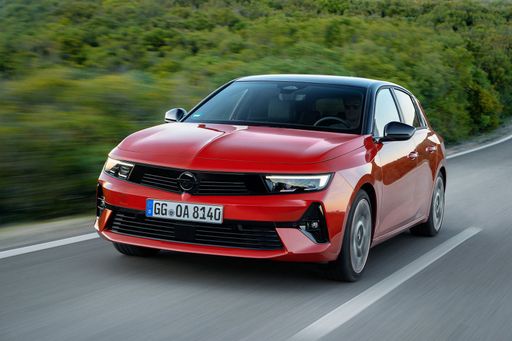 @ www.media.stellantis.com
@ www.media.stellantis.com
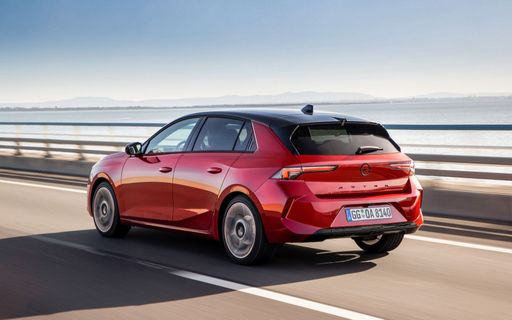 @ www.media.stellantis.com
@ www.media.stellantis.com
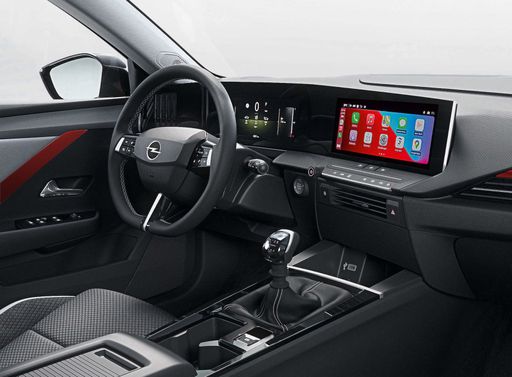 @ www.media.stellantis.com
@ www.media.stellantis.com
Kia Ceed
The Kia Ceed stands out in the compact car segment with its sleek design and impressive handling. It offers a comfortable and well-equipped interior that appeals to both drivers and passengers. With its efficient engine options, the Ceed provides a smooth and enjoyable driving experience suitable for city commutes and longer journeys alike.
details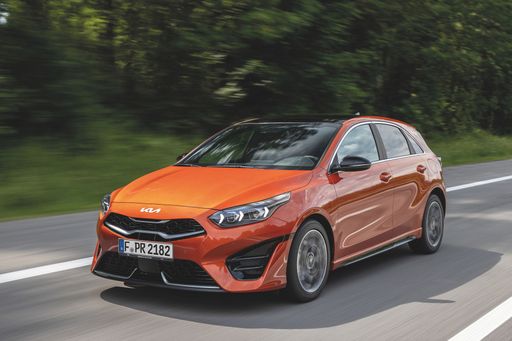 @ press.kia.com
@ press.kia.com
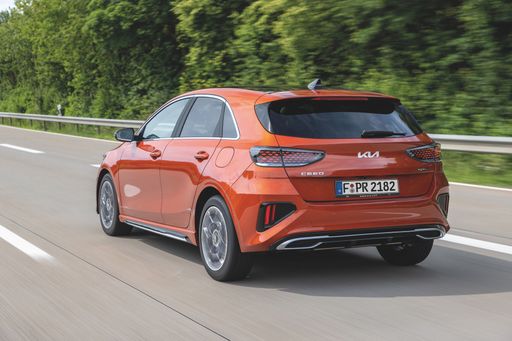 @ press.kia.com
@ press.kia.com
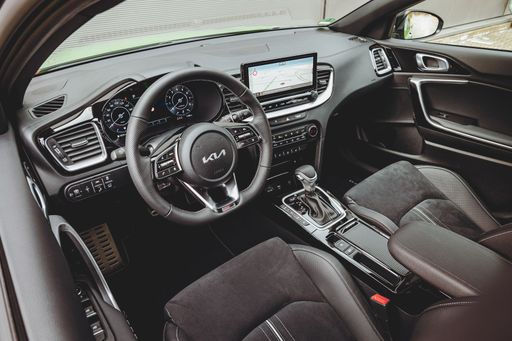 @ press.kia.com
@ press.kia.com
The Battle of Hatchbacks: Kia Ceed vs. Vauxhall Astra
In the ever-evolving landscape of automotive excellence, the hatchback segment continues to demand attention with its practical appeal and innovative features. Today, we put two formidable contenders head-to-head: the 2024 Kia Ceed and the Vauxhall Astra. Both models boast impressive credentials, but which stands out as the superior choice for the discerning driver? Let's delve into their technical aspects and innovations.
Engine Varieties and Performance
The 2024 Kia Ceed offers a choice between two petrol engines: a 1.0-liter and a 1.5-liter, both available with Mild Hybrid Electric Vehicle (MHEV) technology. The power output ranges from 100 HP to 140 HP, with torque figures from 172 Nm to 253 Nm. A dual-clutch automatic or a manual gearbox enhances versatility, propelling the Ceed from 0 to 100 km/h in as little as 9.5 seconds.
On the other hand, the Vauxhall Astra showcases a broader engine lineup, including petrol, diesel, plug-in hybrid, and even electric powertrains. Horsepower varies from 110 in the petrol variant to a robust 225 in the plug-in hybrid. The electric version offers an impressive range of up to 418 km, truly setting a benchmark in eco-friendliness. The Astra's acceleration is brisk, with the fastest variant hitting 100 km/h in just 7.5 seconds.
Fuel Efficiency and Eco-Credentials
Kia's Ceed boasts a consumption range of 6 to 6.4 L/100km, a respectable figure for its class. However, the Vauxhall Astra edges ahead with a broader range, achieving as low as 1.3 L/100km in its plug-in hybrid variant, alongside a highly efficient electric model offering usage at only 15.5 kWh/100km. The Astra also shines in terms of CO2 emissions, with efficiency classes ranging from A to C, making it the greener choice in this comparison.
Technology and Innovations
As technological advancements continue to redefine the automotive experience, both Kia Ceed and Vauxhall Astra rise to the challenge. Kia equips the Ceed with modern connectivity features and driver assist systems that enhance both safety and convenience. Meanwhile, the Astra incorporates cutting-edge technology such as advanced hybrid systems and an all-electric drivetrain, reflecting a commitment to sustainable innovation.
Interior Space and Practicality
Hatchbacks are renowned for their practicality, and both contenders uphold this reputation. The Kia Ceed offers a trunk capacity ranging from 357 to 395 liters, depending on the configuration, alongside a body length of approximately 4,315 mm. Conversely, Astra provides a slightly more generous trunk space of up to 422 liters and a length of 4,374 mm, offering slightly more room for those family road trips or city commutes.
The Verdict: Which Hatchback Reigns Supreme?
Ultimately, the choice between the Kia Ceed and the Vauxhall Astra hinges on personal priorities. The Ceed offers simplicity and reliability with efficient petrol engines and excellent manual and automatic transmission options. However, the Astra sets a higher bar with its pioneering hybrid and electric powertrains, broadening the horizon for environmentally-conscious consumers. Whichever model you choose, both the Kia Ceed and Vauxhall Astra prove that hatchbacks are far from bland and remain pivotal players in the automotive market.

|

|
|
|
|
Costs and Consumption |
|
|---|---|
|
Price
25000 - 40500 £
|
Price
23500 - 26300 £
|
|
Consumption L/100km
2.2 - 6 L
|
Consumption L/100km
6 - 6.4 L
|
|
Consumption kWh/100km
15.60 kWh
|
Consumption kWh/100km
-
|
|
Electric Range
82 - 418 km
|
Electric Range
-
|
|
Battery Capacity
51 kWh
|
Battery Capacity
-
|
|
co2
0 - 135 g/km
|
co2
137 - 146 g/km
|
|
Fuel tank capacity
42 - 52 L
|
Fuel tank capacity
50 L
|
Dimensions and Body |
|
|---|---|
|
Body Type
Hatchback
|
Body Type
Hatchback
|
|
Seats
5
|
Seats
5
|
|
Doors
5
|
Doors
5
|
|
Curb weight
1341 - 1736 kg
|
Curb weight
1298 - 1372 kg
|
|
Trunk capacity
352 - 422 L
|
Trunk capacity
357 - 395 L
|
|
Length
4374 mm
|
Length
4315 mm
|
|
Width
1860 mm
|
Width
1800 mm
|
|
Height
1432 - 1488 mm
|
Height
1447 mm
|
|
Payload
414 - 509 kg
|
Payload
478 - 490 kg
|
Engine and Performance |
|
|---|---|
|
Engine Type
Petrol, Diesel, Electric, Petrol MHEV, Plugin Hybrid
|
Engine Type
Petrol, Petrol MHEV
|
|
Transmission
Manuel, Automatic
|
Transmission
Manuel, Automatic
|
|
Transmission Detail
Manual Gearbox, Automatic Gearbox, Dual-Clutch Automatic
|
Transmission Detail
Manual Gearbox, Dual-Clutch Automatic
|
|
Drive Type
Front-Wheel Drive
|
Drive Type
Front-Wheel Drive
|
|
Power HP
130 - 225 HP
|
Power HP
100 - 140 HP
|
|
Acceleration 0-100km/h
7.5 - 10.6 s
|
Acceleration 0-100km/h
9.5 - 13.2 s
|
|
Max Speed
170 - 235 km/h
|
Max Speed
178 - 197 km/h
|
|
Torque
230 - 360 Nm
|
Torque
172 - 253 Nm
|
|
Number of Cylinders
3 - 4
|
Number of Cylinders
3 - 4
|
|
Power kW
96 - 165 kW
|
Power kW
74 - 103 kW
|
|
Engine capacity
1199 - 1598 cm3
|
Engine capacity
998 - 1482 cm3
|
General |
|
|---|---|
|
Model Year
2023 - 2025
|
Model Year
2024
|
|
CO2 Efficiency Class
D, A, C, B
|
CO2 Efficiency Class
E
|
|
Brand
Vauxhall
|
Brand
Kia
|
Vauxhall Astra
Opel Astra: A Legacy of Innovation and Technology
The Opel Astra has been a staple in the automotive market, continuously evolving to integrate cutting-edge technology and innovation. The latest versions of the Astra model continue this tradition, offering a range of engine types and an array of features designed to enhance driving performance and efficiency.
A Comprehensive Range of Powertrains
The latest Opel Astra models boast a selection of advanced powertrains, providing options for every type of driver. From the efficiency-oriented Mild-Hybrid engines to the cutting-edge fully electric variants, the Opel Astra is tailored to meet diverse customer needs. Car enthusiasts can choose from petrol, diesel, and hybrid engine types, with power outputs ranging between 110 PS and 225 PS, ensuring both efficiency and performance.
Sustainability Meets Performance
In an era where sustainability is paramount, the Opel Astra makes significant strides with its eco-friendly models. The Plug-In Hybrid options within the range offer an impressive fuel consumption rate of just 1.3 L/100km, highlighting Opel's commitment to reducing carbon footprints. Furthermore, the fully electric Astra model boasts an extended range of up to 418 km, catering to the growing demand for zero-emission vehicles.
Advanced Driving Dynamics
The Opel Astra is not just about power; it also offers an exceptional driving experience. With advanced gear options such as automatic transmissions and fine-tuned manual gearboxes, the Astra ensures smooth transitions and responsiveness. The front-wheel-drive configuration provides balanced handling, making it suitable for various driving conditions.
Technology and Features Galore
Opel has equipped the Astra with a myriad of technological advancements aimed at enhancing the driving experience. Cutting-edge infotainment systems, driver-assistance features, and comfortable interiors make every journey enjoyable. Buyers can also choose from multiple trim levels to personalise their Astra, ensuring it fits their lifestyle perfectly.
A Versatile and Stylish Design
The Opel Astra's sleek and modern design makes a bold statement on the road. With dimensions of 4,374 mm in length and a width of 1,860 mm, the Astra strikes a confident pose. Despite its compact build, the hatchback offers ample interior space, including a boot capacity ranging from 352 to 422 litres, embodying practicality without compromising on style.
Value for Money
Starting at a competitive price range between 27,910 € and 47,260 €, the Opel Astra offers excellent value for its array of features and performance capabilities. Its cost-effectiveness is also evident in the monthly operational costs, making it an attractive option for consumers looking for a reliable and cost-efficient vehicle.
The Opel Astra continues to set benchmarks in the compact car segment, effortlessly blending innovation, sustainability, and performance. With its range of versatile powertrains and cutting-edge technology, the Astra is poised to meet the demands of modern drivers while contributing to a greener future.
Kia Ceed
Discovering the Kia Ceed: A Symbol of Modernity
In the dynamic world of automotive engineering, Kia has consistently stood out with its innovative and reliable models. The Kia Ceed is no exception, bringing a blend of efficiency, style, and cutting-edge technology to the table. Let's delve into the details of this eye-catching hatchback and uncover what makes it an alluring choice for modern drivers.
Power and Performance: Under the Hood
The Kia Ceed is equipped with an impressive range of powertrains, offering a selection between petrol engines and mild-hybrid technology. The engine lineup boasts power outputs from 100 to 140 PS, catering to both economical driving needs and those seeking a bit more thrill on the road. The engine choices are complemented by either a smooth manual transmission or a state-of-the-art dual-clutch automatic, ensuring an engaging driving experience tailored to individual preferences.
Efficient and Eco-Friendly Engineering
Kia's dedication to eco-friendliness is evident in the Ceed's engineering, offering remarkable fuel efficiency between 6 to 6.4 L/100km. This focus not only keeps running costs low but also helps reduce emissions, maintaining a responsible footprint with CO2 emissions ranging from 137 to 146 g/km. This efficient performance ensures the Kia Ceed is both a financially savvy and environmentally considerate choice.
Advanced Technologies and Safety Features
Innovation is at the heart of the Kia Ceed's design, with a suite of advanced technological features enhancing comfort and safety. The latest driver-assist systems help keep occupants secure, providing confidence on every journey. Lane Keeping Assist, Forward Collision Warning, and Intelligent Speed Limit Assist are just some of the high-tech features that work seamlessly in the background, making driving both safer and more relaxed.
Styling and Comfort: A Perfect Cabin Space
Stepping into the Kia Ceed, drivers and passengers are greeted by a sophisticated interior, designed for comfort and style. Seen in multiple variants including the Nightline Edition and GT Line, the Ceed offers a premium feel across all its models. With dimensions that promise ample space—stretching up to 4325 mm in length and offering a boot capacity between 357 to 395 L—the Ceed perfectly accommodates both daily commutes and adventurous getaways.
Value for Money: A Wise Investment
Balancing a competitive initial outlay, ranging from €25,590 to €35,090, with low running costs, the Kia Ceed redefines value for money. This hatchback's adaptability to various lifestyle needs, paired with monthly costs from €887 to €1,019, positions it as a wise investment in the current automotive market.
Conclusion: The Kia Ceed in a Nutshell
The 2024 Kia Ceed superbly combines power, efficiency, and cutting-edge innovations, making it a noteworthy contender in the hatchback segment. Whether it’s the eco-friendly credentials, advanced safety systems, or the blend of practicality and style, the Kia Ceed is primed to lead the way in the evolving era of modern vehicles.
Which drive types are available for the Vauxhall Astra?
Available as Front-Wheel Drive.
The prices and data displayed are estimates based on German list prices and may vary by country. This information is not legally binding.
